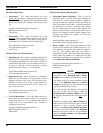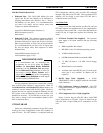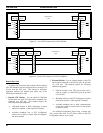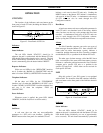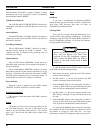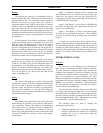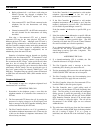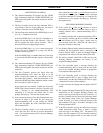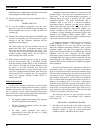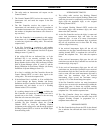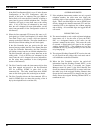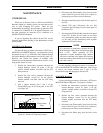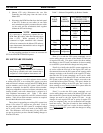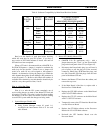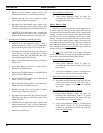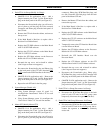
LBI-39076B OPERATION
40
PCM Data Bus (completing the audio path between the
calling telephone and the called radio(s)).
28. The Site Controller directs the line-connected GTI to
look for DTMF digits.
ENDING THE CALL
29. To end the telephone interconnect call, the caller
presses the # key on the DTMF keypad and hangs up.
(If the telephone does not have a # key, the caller can
just hang up.)
30. When the line-connected GTI detects the DTMF # digit
(or end of call signaling, if the line provides it), it gets a
message to the Site Controller indicating that the
telephone has been hung up.
The called radio user can also terminate the call by
pushing the EXIT, SPC, or designated button on the
radio (see the operator's manual for the radio). This
causes the radio to transmit a disconnect signal to the
assigned working channel GETC, and the GETC to
send a message to the Site Controller.
31. When the Site Controller receives a hang up message
from the line-connected GTI, a disconnect message
from the Working Channel GETC, or the Transmission
Conv Limit is exceeded (see System Manager screen
10, panel 2.), the Site Controller first directs the
channel-connected GTI to extract itself from the audio
loop of the assigned Working Channel, then directs the
line-connected GTI to hang-up the line, and finally
directs the assigned Working Channel GETC to
terminate the call.
Radio-Originated Call
A request for a telephone interconnect call can be made
from any radio that is equipped with the controls to place a
telephone interconnect call. However, a telephone line will
not be connected and the trapped telephone interconnect
digits will not be re-dialed to the telephone line until the Site
Controller computer has verified the following:
• The trapped telephone interconnect digits meet the
toll call restrictions for that radio ID.
• The Site Controller computer receives the digital
stream terminator digit.
• All other system parameter and protocol
requirements are met along the way (i.e., calling
radio is valid for the site).
A telephone interconnect number is a string of decimal
numbers (digits). The string can be anywhere from 0 to 32
digits long. It can be pre-programmed (pre-stored), or
manually keyed just prior to pressing the PTT switch
(temporarily-stored). The radio automatically adds a
terminator digit to the end of a pre-stored telephone
interconnect number. However, you may have to manually
add the terminator digit (press the * Key) at the end of a
temporarily-stored telephone interconnect number (see
operator’s manual for the radio). When a working channel
is assigned, all digits including the terminator digit are sent
digitally to the assigned working channel GETC. The
channel-connected GTI takes the digitally-transmitted digits
and decodes them for the Site Controller.
A telephone interconnect number may be a complete or
partial telephone number. (An example of a partial
telephone number is an access code plus an area code.)
When the telephone interconnect number is only a partial
telephone number, the caller must supply the remaining
digits of the telephone number as overdialed digits, after the
telephone line has been connected and the trapped
interconnect digits have been re-dialed on the telephone line.
Overdialed digits are logged by the Site Controller and then
passed directly to the telephone line, through the channel-
connected GTI and line-connected GTI, without interception
and regeneration.
The toll call restrictions test is performed on the first 4
interconnect digits, or as many of the first 4 interconnect
digits as it has received before receiving the terminator digit.
The lack of the terminator digit will not hold up the toll call
restrictions test once 4 interconnect digits are received, but
the terminator digit must be received before the telephone
line is connected and the trapped interconnect digits are re-
dialed to the telephone line. If less than 4 interconnect
digits have been received by the time the terminator digit is
received, the Site Controller adds wild-card digits to the end
of the string of received interconnect digits, until it has 4
digits for the toll call restrictions test. Each wild-card digit
is tested for all possible values from 0 to 9.
The following sequence of steps describes the main
events involved in a radio-initiated local telephone
interconnect call:
OBTAINING A WORKING CHANNEL
1. The radio user sets the radio to the mode of operation
that allows an interconnect call, selects a pre-stored
telephone number or types in a temporarily-stored
telephone number, and pushes the PTT switch.



